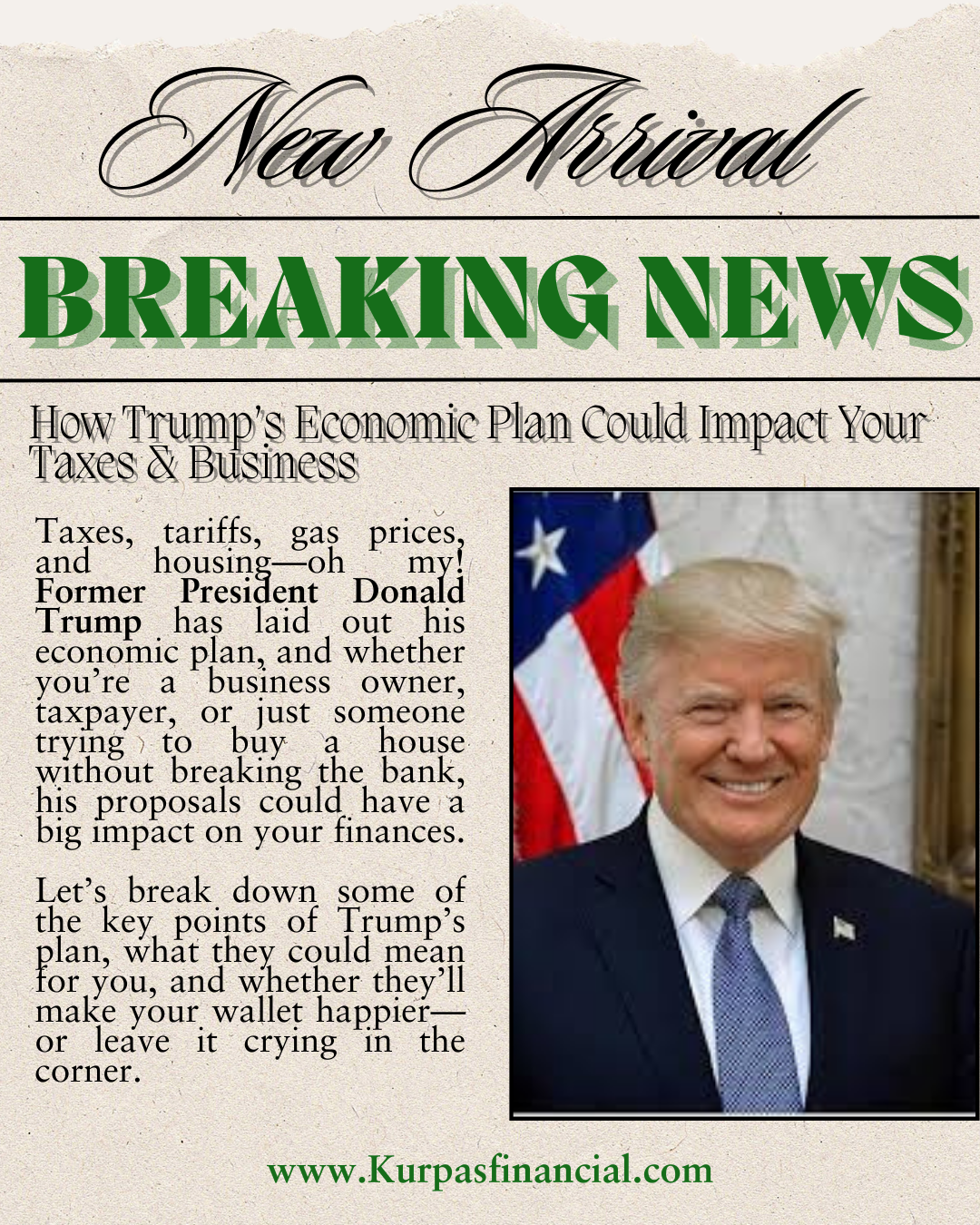Breaking Down Tax Cuts, Tariffs, Gas Prices, and the Housing Market
Taxes, tariffs, gas prices, and housing—oh my! Former President Donald Trump has laid out his economic plan, and whether you’re a business owner, taxpayer, or just someone trying to buy a house without breaking the bank, his proposals could have a big impact on your finances.
Let’s break down some of the key points of Trump’s plan, what they could mean for you, and whether they’ll make your wallet happier—or leave it crying in the corner.
1. Tax Cuts: More Money in Your Pocket?
Trump wants to extend the tax cuts he introduced in 2017, which lowered tax rates for most income brackets and increased the standard deduction. If you take the standard deduction instead of itemizing (which most people do), this means you could keep more of your money come tax time.
For context, under the current law, households making between $60,000–$100,000 a year would owe about $1,000 less in taxes than they would if Trump’s 2017 cuts expired. That’s an extra grand in your pocket—enough to cover a few months of groceries, a vacation fund boost, or maybe a few too many impulse Amazon buys.
The Catch?
Tax cuts mean less government revenue, and experts say this could add a staggering $7.75 trillion to the national debt. And since Social Security is already struggling, this could lead to a 23% cut in benefits by 2035. So, while lower taxes sound great now, the long-term impact on government programs could be a concern.
Bonus: Trump also wants to eliminate federal taxes on Social Security benefits, overtime pay, and tips—something that could benefit retirees and hourly workers alike.
2. Tariffs: A Tax by Any Other Name?
Trump loves tariffs almost as much as he loves talking about tariffs. His latest proposal includes a 25% tariff on all Mexican and Canadian imports and a 10% tariff on Chinese imports. The goal? Boost American manufacturing by making foreign goods more expensive, which could encourage businesses to make their products in the U.S. instead.
The Catch?
While this sounds good in theory, tariffs often backfire by raising consumer prices. U.S. companies that import goods will be the ones paying these tariffs, and guess what? They’ll pass those costs onto you.
One estimate suggests Trump’s proposed tariffs could add around $2,600 per year to household expenses on things like electronics, cars, and everyday goods. So, if you’ve been eyeing that new laptop, you might want to grab it before these tariffs kick in.
3. Gas Prices: Will They Go Down?
Trump plans to ramp up U.S. oil and gas production to lower gas prices. But will it actually work?
Here’s the thing: The U.S. already produces more oil than any other country, yet gas prices still depend on global markets. Even if we drill more, events like conflicts in the Middle East or OPEC decisions could still cause prices at the pump to fluctuate.
In short, while increasing production might help a little, don’t expect to fill up your tank for pocket change anytime soon.
4. Housing Market: Can You Finally Afford a Home?
If buying a house feels impossible right now, Trump’s plan might offer some relief. He wants to make housing more affordable by cutting regulations that drive up construction costs and opening federal land for development.
More housing supply = potentially lower prices.
The Catch?
Presidents don’t directly control housing prices or interest rates—those are determined by supply and demand, along with the Federal Reserve’s policies. So, while Trump’s plan could help increase supply, it’s not a magic fix.
Plus, experts say long-term affordability also depends on zoning laws and infrastructure, which aren’t exactly easy to change overnight.
Final Thoughts: What Does This Mean for You?
Trump’s economic plan includes some big promises—lower taxes, cheaper gas, and more affordable homes. But as with most things in economics, there are trade-offs. Lower taxes could mean higher national debt. Tariffs could make goods more expensive. And gas prices? Well, they’ll always be unpredictable.
So, what can you do?
📌 Stay informed. Tax laws and economic policies change frequently—make sure you know how they affect your wallet.
📌 Plan ahead. If tax cuts do extend, consider adjusting your financial plan accordingly.
📌 Get expert help. Taxes can be tricky, and that’s where we come in! Whether you’re a business owner or an individual, we’ll help you navigate the tax code and keep more of your hard-earned money.
Got tax questions? Need help maximizing deductions? Let’s chat! 💼💰

